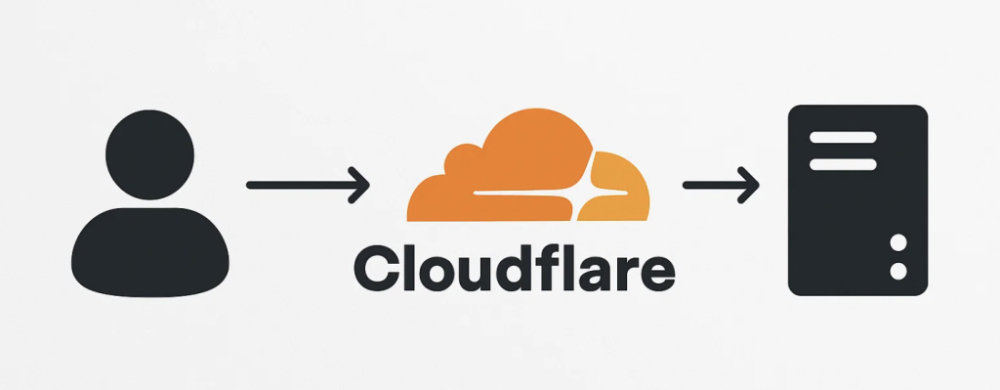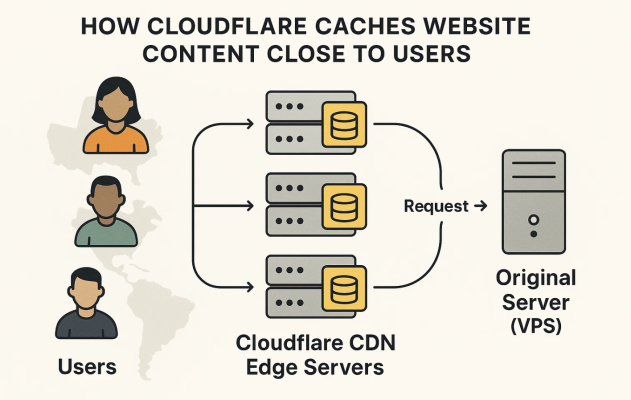Cloudflare isn’t just another tool from the world of web technologies. It’s more like an invisible backstage assistant: millions of websites rely on it every day to load faster, stay online, and be a little safer from attacks. You might not even realize it, but chances are, at least one of your favorite websites already uses Cloudflare.
By 2025, Cloudflare has become something close to an industry standard — used by large corporations and small website owners alike. Why? It makes life easier: speeding up page loads, lightening the server’s load, and adding an extra layer of protection. All without needing deep technical knowledge.
Even if you just run a simple blog, a landing page, or a tiny online shop, it’s worth at least knowing what Cloudflare is and why it’s become such a common part of the modern internet.
How Cloudflare works — in simple words
When someone opens a website, their request doesn’t go directly to the site’s server. Instead, it first passes through Cloudflare. Think of Cloudflare as a checkpoint or maybe even a “transfer station.†It checks: is this a safe request? Is there already a cached version of the page? If yes — great, it returns the page immediately. If not — no problem, the request is forwarded to the original server.
Here’s how it works: user clicks a link → request reaches the nearest Cloudflare data center → if needed, it’s sent to the main server.
This speeds things up. For example, a visitor from Australia might get the page from a Cloudflare server nearby instead of waiting for a response from Europe.
Another important thing: Cloudflare hides the real IP address of the website and filters out suspicious traffic. And thanks to Anycast technology, requests always go to the nearest Cloudflare point, which reduces delays even more.
In simple terms, Cloudflare is like a helpful middleman between the user and the website, making sure everything works fast and stays secure.
 Core features of Cloudflare
Core features of Cloudflare
Cloudflare is a service that makes life easier for anyone running a website. It doesn’t just help your pages load faster — it also keeps your site more reliable.
The first thing that comes in handy is the global network of servers. Thanks to this, your website loads quickly even for visitors far away: they simply get a copy of your page from the nearest server instead of waiting for a response from your original hosting.
Second, Cloudflare protects against overloads. Sometimes websites are hit with a flood of requests — known as a DDoS attack — to try and knock them offline. Cloudflare filters out this bad traffic and keeps your site running smoothly.
There’s also a built-in firewall to block hacking attempts. You can turn it on in just a couple of clicks and it helps protect your site from common attacks.
Finally, Cloudflare’s DNS is fast and reliable, so your visitors’ browsers can quickly find where your site lives — no unnecessary delays.
When should you use Cloudflare
Cloudflare is a great fit for most modern websites. Here are a few examples when it really makes sense:
- You run a blog with an international audience. Cloudflare helps your pages load faster for visitors from different countries.
- An online store: protection from attacks and stable performance during busy hours are key benefits for e-commerce.
- A company’s corporate website: Cloudflare improves your brand’s reputation by ensuring fast response times and reliability.
But sometimes Cloudflare isn’t necessary. For example, if your site is only used within a private corporate network, or it’s available to a small group of users in one city, adding a proxy layer and caching won’t offer much benefit — it might just complicate the setup.
Cloudflare and VPS
If your site runs on a VPS, pairing it with Cloudflare makes things much easier. A VPS gives you flexibility and full control, but it also comes with its own risks — spikes in load, attacks, and so on. Cloudflare helps smooth out those problems.
For example, it reduces the load on your VPS by serving static content — images, scripts, styles — directly from Cloudflare’s network instead of your own server. That means faster load times and less strain on your VPS resources.
Cloudflare also acts as protection against DDoS attacks, filtering out malicious traffic before it even reaches your server. That’s particularly valuable for public-facing sites with visitors from all over the world.
This combo is ideal for online shops, blogs, corporate sites — projects that are growing but not yet ready for costly server upgrades.
Advantages and disadvantages of Cloudflare
In a nutshell — Cloudflare has plenty of benefits but also a few things to keep in mind. Let’s go over them:
Pros:
- Loading speed: your site loads faster since cached copies are served from data centers around the world.
- Protection: blocks harmful traffic and mitigates even large-scale DDoS attacks.
- Easy setup: most features can be activated in just a few clicks — beginner-friendly.
Cons:
- Origin IP handling: your server’s real IP is hidden, which can complicate firewall setup or debugging.
- Caching quirks: when you update your site, changes might not appear immediately unless caching is properly configured.
- Dependence on Cloudflare: if their network goes down (rare, but possible), your site may temporarily become unavailable.
Conclusion
Cloudflare is a convenient tool that has become a standard for speeding up websites, protecting them from attacks, and simplifying administration. Even small projects benefit: a blog, an online store, or a company website will run faster and more securely without complicated setup.
And if you’re planning to host your project on a VPS, combining VPS + Cloudflare can be especially effective: reduced server load and protection without hassle.
By the way, if you’re looking for a VPS, you can use promo code HELLO — it gives you a 15% discount on any VPS in any THE.Hosting location.
You don’t need to know every technical detail — but being aware of what Cloudflare does and how it helps is useful for anyone working with websites in 2025.
